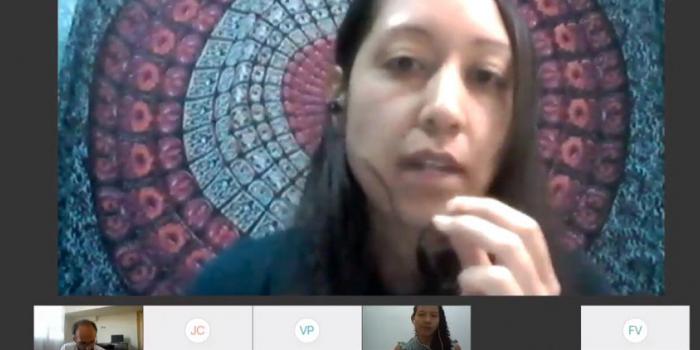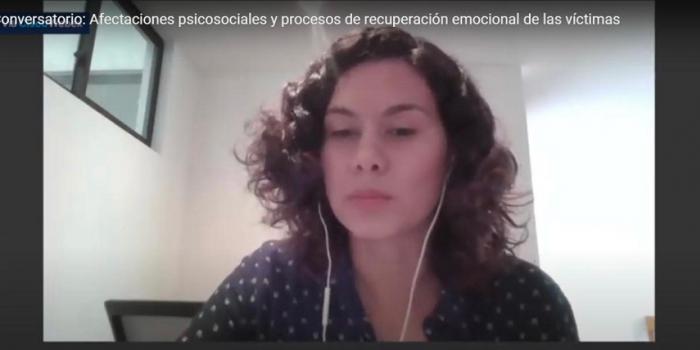
Victims and psychologists analyzed the psychosocial impact of transnational forced migration
The event was organized by Universidad de los Andes and the Victims Unit.


Universidad de los Andes and the Unit for Victims convened a virtual dialogue about the effects that thousands of Colombians who have fled the country due to the internal armed conflict have experienced.
Likewise, during the event, multiple forms of psychosocial care and support were analyzed, based on the experiences of victims' organizations, academic institutions, and the Colombian institutions.
As a starting point, Juan Pablo Aranguren, academic director of the Faculty of Social Sciences of Andes University and moderator of the panel, stressed that language - forced migration, exile, refuge, victim - illustrates the diversity of identities and experiences of those who have emigrated for the violence generated by the conflict.
In this regard, the Victims Unit pointed out that all these interpretations are valid and that recognizing them is important to achieve comprehensive reparation for the victims. Likewise, he emphasized that the migration experience and the violence that the victims have experienced are two inseparable issues that must be analyzed as a dimension of armed conflict.
For his part, Javier Charry, a psychologist with experience in the care of asylees and refugees in Sweden and a member of the International Victims Forum (IVF), addressed the problem of the imaginaries that have affected victims who left the country (for example, the social imaginary that whoever left is better or that the violence has only had individual or sectoral implications).
In this regard, Charry pointed out that, based on the analysis of various sources, including the Commission for the Clarification of the Truth, there has been organized violence whose intention has been to break the social network. Regarding the effects for those who emigrated, he also indicated: "In the displacement towards the borders there are specificities in the psychosocial with the prolongation of the traumatic situation and the effects of the threat, fear and silence".
For her part, the psychologist Melba Revelo, who has worked on the recently implemented Group Emotional Recovery Strategy with victims of armed conflict in Costa Rica, drew the panorama of damages suffered by victims in different areas of their lives, such as economic, relational, family and professional, among others.
Regarding this, Verónica González, founder of the Ecos de Colombia organization in Costa Rica, the victims' organization within which the Victims Unit is accompanying the implementation of the aforementioned strategy, shared that in the working sessions she perceived in the participants a “tremendous loneliness as a consequence of [the] family breakdowns” that they have experienced both due to violence and emigration.
To talk about the organizational processes and the ways in which the victims have faced experiences such as exile, Mauricio Viloria, Colombian refugee in Argentina, social worker and member of the Colombian Migrants and Exiles for Peace collective and the Victims Network Colombianas por la Paz (Revicpaz - Lac), first put into context four types of external forced migration that have been identified in various studies and reaffirmed in the processes carried out by the Commission for the Clarification of the Truth and the Search Unit for Persons given for Disappeared, within the framework of its approach with victims in the southern cone.
Viloria said that psychosocial accompaniment to victims of armed conflict to narrate and make visible what they have experienced is one of the approaches that organizations such as Mecopa have, understanding that such support is essential from the point of view of dignifying the victims and ensuring their well-being in the processes of truth construction.
Elaborating more on the forms of psychosocial care and accompaniment, Luis Carlos Sotelo, a professor at the University of Concordia in Canada and a member of the FIV, shared the learnings of the Listening Act Laboratory that the university conducts with victims of the conflict who emigrated to that country. "This is a space where art is combined with the narrative processes of the victims", said Sotelo, who stressed that art provides another way of listening and assimilating what has been experienced.
To learn more about the arguments and reflections addressed in this dialogue, you can consult the complete recording at https://www.youtube.com/watch?v=AmWl_zVlzIw
(End/GAVE/CMC/LMY)






